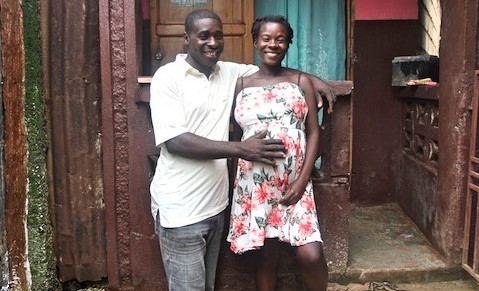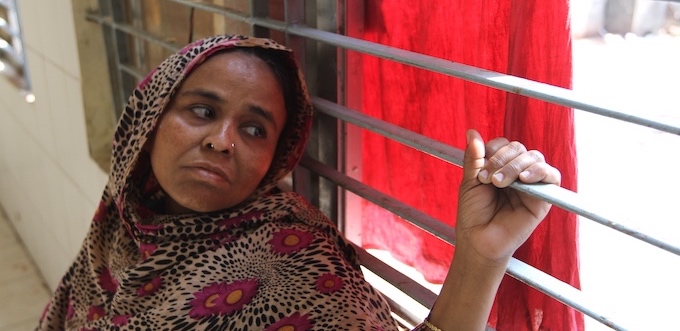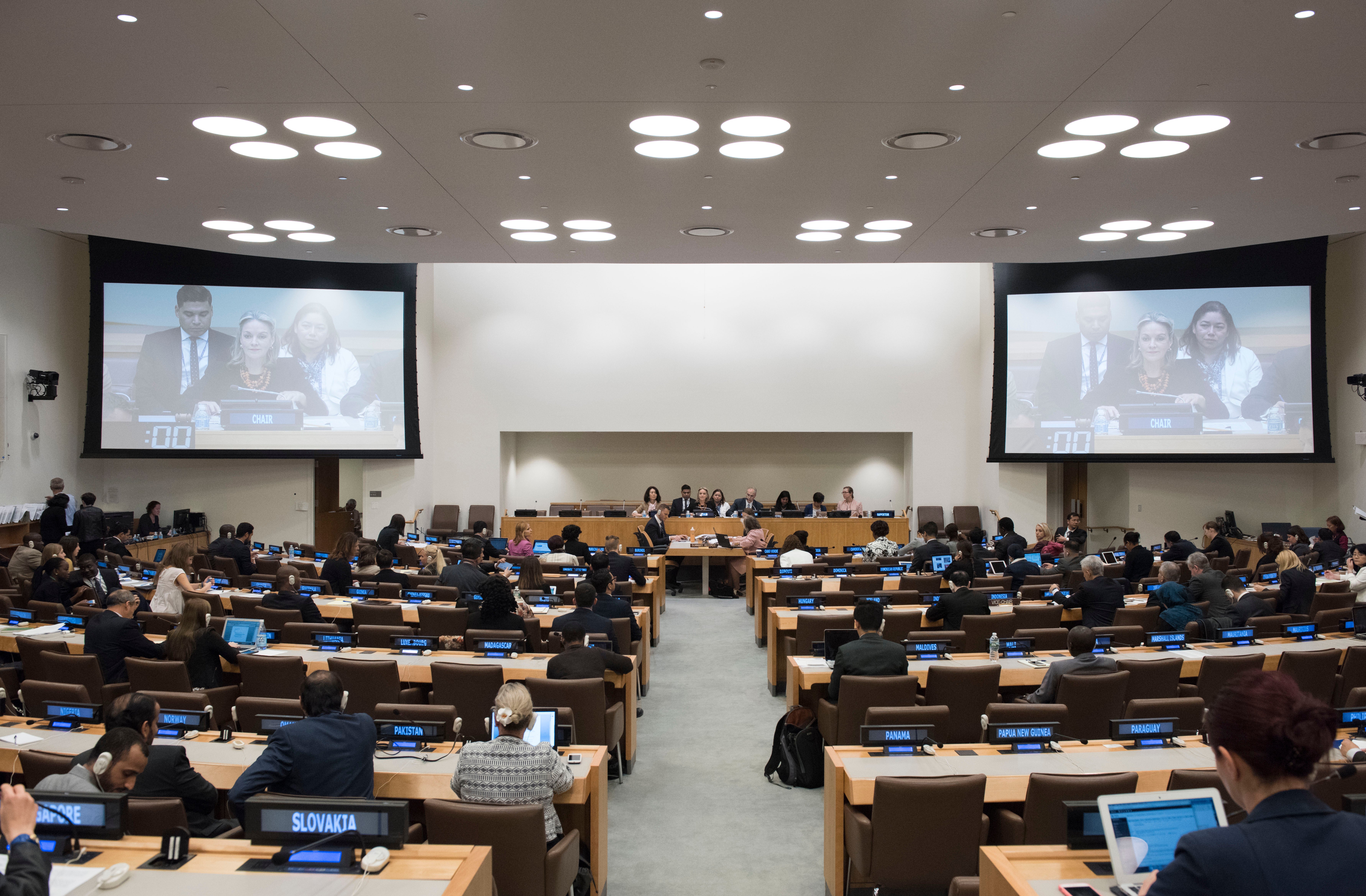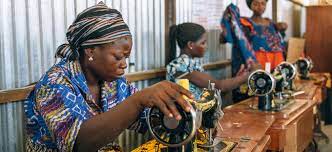News & Updates
Obstetric fistula stories and announcements
Obstetric fistula stories and announcements


Statement of UNFPA Executive Director Dr. Natalia Kanem on the International Day to End Obstetric Fistula, 23 May 2019
Learn more
Statement of UNFPA Executive Director Dr. Natalia Kanem on the International Day to End Obstetric Fistula, 23 May 2019
Shame, isolation and segregation are among the indignities faced by the hundreds of thousands of women and girls worldwide who suffer from obstetric fistula, an injury of the birth canal after prolonged and obstructed labour. The girls and women afflicted by the condition, which is preventable and largely treatable, are often plagued by chronic incontinence. As a result, they face devastating social stigma.
The majority of women and girls who suffer from fistula are poor. Their inability to receive prompt medical treatment not only deprives them of their health and dignity, but is a violation of their human rights.
UNFPA leads the Campaign to End Fistula. Since 2003, UNFPA has supported over 100,000 fistula repair surgeries, and campaign partners have supported thousands more, enabling women and girls in more than 55 countries across Africa, Asia, the Arab region and Latin America to regain hope and rebuild their lives.
One survivor, Nasiwelo Bisolomo, lost her baby at the age of 18 after a prolonged obstructed labour at home. She suffered from fistula for the next 46 years. She nearly had lost all hope when she heard of a UNFPA-supported fistula camp and travelled 300 km to undergo the life-transforming healing surgery. Now, she is helping spread the word that fistula treatment is available.
It is time for the world to heed the call made by United Nations Member States in the 2018 United Nations Resolution on Ending Fistula in which they committed to eradicating the condition within a decade. Yet, achieving this goal requires increased investments, innovations and partnerships. Failure to take action will undermine our chances of achieving the Sustainable Development Goals, meeting the commitments of the International Conference on Population and Development, and ensuring no one is left behind.
No woman or girl should be deprived of her dignity, hopes and dreams. Fistula is a human rights violation – end it now!

United Nations, New York – The Committee on Social, Humanitarian and Cultural Issues of the United Nations General Assembly adopted a UNFPA-backed resolution today that calls upon the international community to end fistula within a generation.
Learn moreUnited Nations, New York – The Committee on Social, Humanitarian and Cultural Issues of the United Nations General Assembly adopted a UNFPA-backed resolution today that calls upon the international community to end fistula within a generation.
The resolution, co-sponsored by more than 130 countries, calls on States to take all measures to ensure the rights of women and girls to the highest standard of mental and physical health, including reproductive health and rights. While recognizing that poverty, lack of maternal health services, early childbearing and early marriage are interlinked as root causes of fistula, the resolution notes that poverty and inequality remain the main social barriers to eradicating fistula.
In its resolution, the Committee urges the international community to redouble efforts to improve maternal health. This includes universal access to skilled birth attendance, high-quality emergency care and family planning, along with appropriate care before and after birth.
The resolution highlights the need to make greater investments in the health sector to ensure skilled health workers, especially midwives, to provide life-saving care. It urges multilateral donors and financial institutions to ensure that more resources reach young women and girls, in particular in rural and remote areas and the poorest urban areas.
The resolution also calls upon the international community to support the activities of UNFPA, the United Nations Population Fund, and its partners in the global Campaign to End Fistula in establishing and financing fistula treatment and training centres.

United Nations, New York – The United Nations General Assembly adopted a UNFPA-backed resolution on obstetric fistula on 18 December 2014, which calls for stepped-up actions to end the condition.
Learn moreUnited Nations, New York – The United Nations General Assembly adopted a UNFPA-backed resolution on obstetric fistula on 18 December 2014, which calls for stepped-up actions to end the condition.
“The resolution is important for millions of women suffering the pain and shame of fistula,” said Dr. Babatunde Osotimehin, Executive Director of UNFPA, the United Nations Population Fund. “With the backing of the international community, UNFPA and its partners in the Campaign to End Fistula can continue to step up our efforts to prevent fistula and treat and re-integrate fistula survivors.”
The UNFPA-led Campaign to End Fistula currently supports about half of all fistulas surgical repairs in developing and emerging countries, where the condition is more prevalent. The number of fistula repairs supported by UNFPA doubled from 5,000 in 2010 to more than 10,000 in 2013. Since 2003, the Campaign has supported more than 47,000 fistula repairs.
The new resolution calls on the international community to intensify technical and financial support to accelerate progress in the remaining days until the deadline to achieve Millennium Development Goal 5 (to improve maternal health) by the end of 2015 and eliminate fistula.
Co-sponsored by more than 150 Member States and adopted by consensus, the resolution also acknowledges obstetric fistula as a notifiable condition, and, as a result, fistula survivors should be registered and tracked in order to receive necessary medical treatment and follow-up medical care for future pregnancies.
Fistula is a childbirth injury caused by prolonged, obstructed labour. It is estimated that at least two million women live with the condition. There are 50,000 to 100,000 new cases per year. Working with more than 90 partners in more than 50 countries, the Campaign to End Fistula strives to make obstetric fistula as rare in developing and emerging countries as it is in industrialized nations.
The General Assembly enshrined the text adopted by its Committee on Committee on Social, Humanitarian and Cultural Issues in November. Read more about the resolution.

Dr. Marchesini, originally from Italy, learned to treat obstetric fistula in 1973, while training at a hospital in Uganda. He knew immediately that he would devote his life to the cause.
The following year, 1974, I went to Mozambique and I began to operate on every woman appearing in my hospital,” Dr. Marchesini said. Those who arrived for treatment were “suffering and rejected women,” he explained.
Learn moreDr. Marchesini, originally from Italy, learned to treat obstetric fistula in 1973, while training at a hospital in Uganda. He knew immediately that he would devote his life to the cause.
The following year, 1974, I went to Mozambique and I began to operate on every woman appearing in my hospital,” Dr. Marchesini said. Those who arrived for treatment were “suffering and rejected women,” he explained.
His work took him all over the country, to hospitals in Quelimane, Mocuba, Tete and Songo. For years, he was the only doctor in Mozambique treating the condition.

Father Aldo Marchesini operates on a fistula patient in Gurue, Mozambique. Photo: UNFPA Mozambique, 2014.
He stayed through the country’s long post-independence civil war, during which he was kidnapped and imprisoned a number of times. But his chief complaint was that women – who had already faced enormous challenges accessing health care – had an even harder time seeking treatment.
“During the civil war, it was very difficult to travel by car or bus. The number of (fistula patients) in our hospital diminished because only patients near Quelimane were able to come to the hospital,” he said. Instead, he went to them. “I was able to go to some provinces for campaigns of two to three weeks by flights with small aircrafts,” he said
Dr. Marchesini has personally operated on more than 1,000 women as a chief surgeon, and as a teacher, he has overseen the treatment of many hundreds of others. But his most lasting contribution will be through the skills he imparts to local healthcare providers. By some estimates, all the physicians in Mozambique now treating obstetric fistula received their training from him.
Established by the General Assembly in 1981, the UN Population Award is presented each year to a laureate or laureates who have made outstanding contributions in the fields of population and health.
The award committee is chaired by the Czech Republic Ambassador to the UN, Edita Hrdá, and consists of representatives of Bangladesh, Côte d’Ivoire, Denmark, Grenada, Jamaica, Qatar, the United Republic of Tanzania, Nigeria and Pakistan. Members of the committee also include UN Secretary-General Ban Ki-moon and UNFPA Executive Director Dr. Babatunde Osotimehin.
The awards were presented by Deputy Secretary-General of the UN Jan Eliasson at a ceremony at UN Headquarters.
"The Population Award is an expression of our joint commitment to ensure a life of dignity for all and to build a world in which every pregnancy is wanted, every childbirth is safe, and every young person’s potential is fulfilled," said Mr. Eliasson, adding: "The commitment of Father Marchesini embody these goals."
Read the original article.

Niger’s ten years of engagement in the fight against obstetric fistula has borne fruit, concluded a workshop held from 8 to 10 October 2013 in the capital Niamey. Organized by UNFPA, the United Nations Population Fund, the even gathered more than 70 health professionals and partners working to end obstetric fistula in several countries.
Learn moreNiger’s ten years of engagement in the fight against obstetric fistula has borne fruit, concluded a workshop held from 8 to 10 October 2013 in the capital Niamey. Organized by UNFPA, the United Nations Population Fund, the even gathered more than 70 health professionals and partners working to end obstetric fistula in several countries. Fistula focal points from UNFPA country offices in the Central African Republic, Chad, the Democratic Republic of the Congo and Mauritania also participated in the workshop to learn from Niger’s rich experience in addressing obstetric fistula, and to improve south-south cooperation.
A cornerstone of fistula response in Niger was the creation of a network that brings national and international stakeholders around the table to discuss challenges and plan for action.
“In general, obstetric fistula touches poor, illiterate and rural women. Due to its dehumanizing consequences, fistula constitutes a public health problem to which Niger has responded by creating the REF—Réseau d’Eradication de la Fistule [Network to Eradicate Fistula]—which gathers all partners in this fight and enables the group to achieve concrete results,” Niger’s Minister of Health Mano Aghali said at the opening of the event.

Minister of Health Mano Aghali (c.) chairs the opening session of the workshop; Monique Clesca, UNFPA Representative in Niger (l.); Gillian Slinger, Coordinator of the Campaign to End Fistula (r.) Photo: UNFPA.
Monique Clesca, UNFPA Representative in Niger said the UN agency has mobilized partners in the country to create the REF around the Ministry of Health. Since 2004, UNFPA has always been an active partner in the fight against fistula in Niger, supporting treatment for about 70 per cent of fistula cases cases identified in the country. Until 2010, UNFPA was the only financing partner for social reintegration activities.
To address the complex problem of fistula, Niger has implemented a strategy based on the three pillars of prevention, medical treatment and reintegration of women into society and the labour market.
Prevention first
Prevention is paramount as obstetric fistula is a direct consequence of poor access to health services during pregnancy and childbirth The REF has carried out numerous community-based activities to increase prevention, such as initiating and supporting community radio stations and women’s associations, operating awareness raising caravans and screening films in villages and towns.
Since 2005, 1,577 women cured from fistula have been trained as community focal points for local awareness raising. “The assignments of cured women constitute a very important strategy as these actions enable communities to understand fistula and show them that fistula is not inevitable but a curable disease,” said Ms. Moussa Mariama, fistula focal point at the Ministry of Health.

Aissa Boubakar (l.) and Roukaya Oumarou told their story (Photo: Monique Clesca/UNFPA)
Part of the prevention activities is to address child marriage and avoid adolescent pregnancy. Physically immature first-time mothers are at increased risk for prolonged, obstructed labour, which may result in obstetric fistula, especially if an emergency Caesarean section is unavailable or inaccessible. In Niger, the average age at the first marriage is 15.
“I wish to launch an appeal to our parents to stop marrying their girls so young. For me, under the age of 18, a girl should not be married,” said Aissa Boubakar, fistula survivor, 26, after telling her story at the opening of the workshop. She was married at the age of 14. Her fistula, developed during her first childbirth, was repaired only after eight surgeries.
“I will now return home and continue testifying. Some women hide. They don’t know what they have and that they can be treated,” concluded Ms. Boubakar.
“I never heard about this condition before. Urine didn’t stop leaking. I was ashamed,” noted Roukaya Oumarou, 25. She developed obstetric fistula after a difficult delivery three years after getting married. She was 18. “I was really scared, but it is important to testify because I know that this can save the lives of other girls,” Ms. Oumarou said.
Fistula repairs free of charge
Medical treatment of women living with fistula is on the rise in Niger. “Everything has changed: taking charge of women living with fistula is now better organized, coordinated and decentralized thanks to the establishment of six treatment centres in the country. Between 2005 and 2012, more than 3,000 women have been treated,” said Dr. Mahaman Tassiou, surgeon at Lamordé Hospital in Niamey. “In addition, patients don't have to pay anything, it’s for free, from admission to discharge,” Dr. Tassiou added.
The workshop encouraged the expansion of this scheme and the establishmetn of new treatment centres in Diffa, near the border with Nigeria, and in Agadez, in central Niger, as well as follow-up investments for reintegration, training and research. The workshop also recommended taking into account the psychological dimension when caring for women living with fistula.

First Lady of Niger, Dr. Malika Issoufou Mahamadou, meets UNFPA delegation (Photo: UNFPA)
Aftercare is key
The reintegration into communities and the labour market is a crucial part of the country’s strategy to tackle the condition, which marginalizes so many women in Niger. The workshop recommended reinforcing social and medical care not only immediately after surgery, but also during all future pregnancies of fistula survivors as they need to plan for Caesarean sections in order to ensure safer childbirth.
Thanks to local associations, cured women receive business training, which allows them to generate an income when they return to their communities. Fistula survivors also receive a $100 loan to start a business. With UNFPA support, more than 1,750 women have been reintegrated since 2005.
The workshop highlighted two new approaches to reintegration. The Danja Fistula Centre, opened in 2012 by the Worldwide Fistula Fund, a partner organization in the Campaign to End Fistula, helps fistula survivors become part of community business. The micro-finance institution Asusu, in Niamey, integrates cured women into a village group.
The workshop recommended that these initiatives be included into the current national strategy to fight fistula. The workshop also encouraged a pilot programme to provide mobile phones—along with solar panels to recharge batteries—to fistula survivors to facilitate keeping in contact with them and to ensure their well-being after they return home, as well as in any future pregnancies.

Fistula patients proudly showing their mobile phones at the National Reference Centre for Obstetric Fistula in Niamey (Photo: UNFPA)
“I am sure that the gains made will be consolidated and that civil society will continue to mobilize support. I am also certain that the solidarity from partners and donors will increase,” said UNFPA Representative Monique Clesca.
“The workshop has developed a vision for continuing the fight against obstetric fistula in Niger, with a special focus on aftercare for survivors of this tragedy,” stressed Gillian Slinger, Coordinator of the global Campaign to End Fistula Campaign.
“Fistula is a neglected public health and human rights issue. While Niger is making good progress in prevention and management of the condition, more expert fistula surgeons and health personnel are urgently required to treat the backlog of cases, and to ensure full recovery and long term well-being of affected women following treatment,” concluded Ms. Slinger.

Abakaliki, Ebonyi State, Nigeria — For the 35 women and young girls clad in orange UNFPA, the United Nations Population Fund t-shirts, it felt like early Christmas in the middle of April, as they prepared to re-join their families after undergoing successful surgeries to repair obstetric fistula. And to see them off at the Ebonyi health centre was the State First Lady, Josephine Elechi, and the UNFPA Representative in Nigeria, Victoria Akyeampong.
Learn moreAbakaliki, Ebonyi State, Nigeria — For the 35 women and young girls clad in orange UNFPA, the United Nations Population Fund t-shirts, it felt like early Christmas in the middle of April, as they prepared to re-join their families after undergoing successful surgeries to repair obstetric fistula. And to see them off at the Ebonyi health centre was the State First Lady, Josephine Elechi, and the UNFPA Representative in Nigeria, Victoria Akyeampong.
Ebonyi State, located in south-eastern Nigeria, has a population of more than two million people who espouse deep-rooted traditional norms, values and practices. The state, which has poor socio-economic indicators, suffers from a high prevalence of fistula, compared to the surrounding states. Its First Lady, Ms. Elechi, has long been active in addressing maternal and child health. In 2008, she established the Mother and Child Care Initiative (MCCI), where the ceremony was taking place.
Since its establishment, MCCI has partnered with UNFPA, USAID, UNICEF and others to provide free safe motherhood services and to address maternal morbidity issues, including obstetric fistula and uterine prolapse.

Kori Habib reported from Nigeria. Edits by Omar Gharzeddine. Photos: UNFPA Nigeria.
Speaking at the discharge ceremony, the First Lady said that, with support from UNFPA and other donors, the centre has so far treated more than 1,600 fistula patients from more than 20 states, as well as 195 women with uterine prolapse. Another 2,000 women received free screening for cervical and breast cancer. Because of its services to the community, MCCI was designated as a National Center for Excellence in 2011.
At the ceremony, Ms. Akyeampong, the UNFPA Resident Representative, paid tribute to First Lady Elechi and her efforts to improve the health of mothers and the vulnerable. She also called on all partners to work collectively on providing access to reproductive health services, eliminating gender-based violence and economic inequalities, preventing child marriage and early child bearing and keeping girls in school. Finally, she asked the graduating women and girls to be champions and speak out about the impact of fistula on women’s lives, their families and communities.
Some of the clients highlighted in their testimonies the horrific hardships they encountered before being rescued by MCCI. They were given hope, they said, when everything seemed to be lost.

As illustrated by this infographic, the road to obstetric fistula is fraught with delays: delays in the progression of labour, delays in getting to an appropriate facility, delays in getting the proper health treatment.
Learn moreAs illustrated by this infographic, the road to obstetric fistula is fraught with delays: delays in the progression of labour, delays in getting to an appropriate facility, delays in getting the proper health treatment.
For those women unfortunate enough to sustain a fistula as a result, some are able to get the advice, care and support that leads to a brighter future. Meanwhile, an estimated 2 million women and girls remain left in the isolation of living with a condition that causes incontinence and intense suffering. The goal of the Campaign to End Fistula is to prevent the condition from occurring in the first place, and to ensure that more women have an opportunity to recover from it and regain their lives.
The infographic was produced for the Campaign to End Fistula in partnership with Johnson & Johnson, a long standing supporter of fistula programmes and efforts to reduce fistula and maternal mortality by scaling-up access to maternal health services and skilled birth attendants.

A new film by Emmy winning film maker Lisa Russell documenting how mobile technology is facilitating fistula treatment in Tanzania had its premiere at the historic Zanzibar International Film Festival—ZIFF, East Africa’s largest film and music gathering, in July. The film, produced with support by UNFPA and the Campaign to End Fistula, was chosen to be part of ZIFF’s Women’s Panorama program which brings select films to screen in the villages.
Learn moreA new film by Emmy winning film maker Lisa Russell documenting how mobile technology is facilitating fistula treatment in Tanzania had its premiere at the historic Zanzibar International Film Festival—ZIFF, East Africa’s largest film and music gathering, in July. The film, produced with support by UNFPA and the Campaign to End Fistula, was chosen to be part of ZIFF’s Women’s Panorama program which brings select films to screen in the villages.